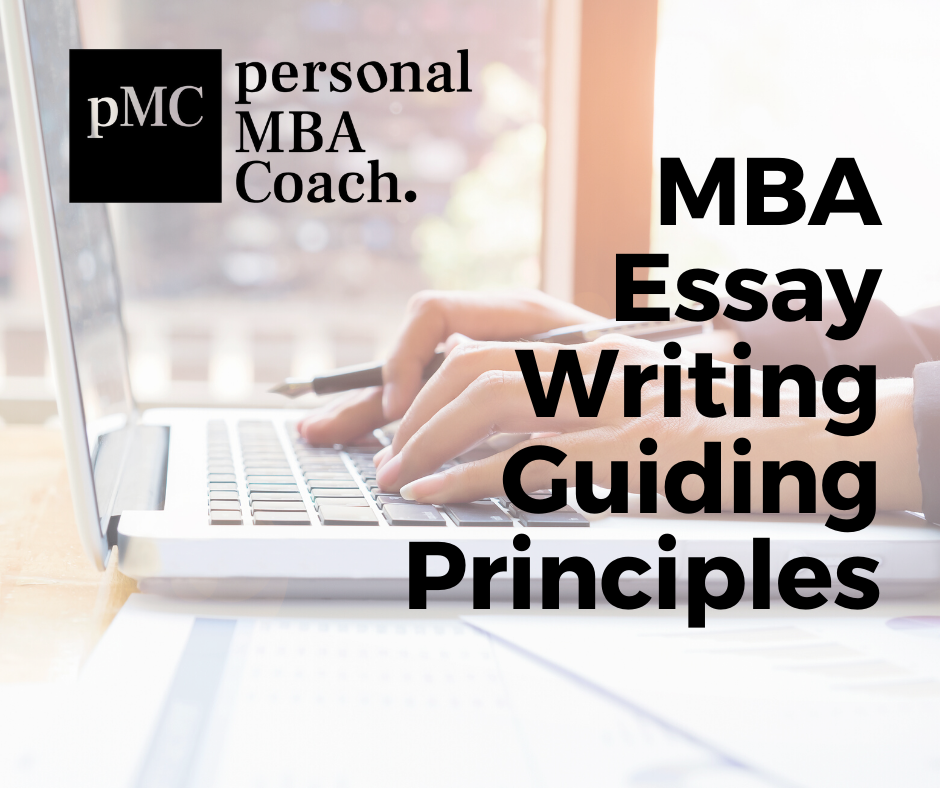
This is the time of year when essay writing is top of mind for most MBA round 2 hopefuls. While Personal MBA Coach has published detailed tips on how to handle most of the top MBA application questions, there are a few key pieces of advice that hold true regardless of the question, and these bear repeating. As you write your essays, keep these five guiding principles in mind.
1) Answer the question ASKED
It is surprising how often candidates write beautiful essays but do not answer the question. Instead of writing what you want to show off, answer the question. While thinking a bit outside of the box and considering the why behind an essay prompt is advised, first and foremost you must answer the question.
2) Write authentically
Do not write what you think admissions committee members want to read. There is no one perfect candidate profile. Instead, your uniqueness will be one of your greatest selling points. Your essays should paint a clear picture of who you are, what motivates you, and what you are passionate about. Do not feel compelled to show how you fit the mold that seemingly makes up the “ideal” candidate. If you have no desire to run a non-profit, that is ok. If you are not motivated by improving the environment, do not pretend you are. Readers will see right through this and you could end up doing more harm than good.
3) Be succinct and avoid repetition
Keep in mind that the essays are just one part of the application. In addition to submitting an MBA resume (Unsure how to write an MBA resume? Check out these tips), most schools will have you fill out a detailed application. This means admissions committee members will read about everything you have accomplished, all roles you have held, and the awards that you have won. There is no need to try to fit this all into your essays. So instead of squeezing in as much as you can, focus on sharing a few key highlights and adding the details as well as your voice. This is your chance to explain your choices, show your accomplishments, and share your passions. The fewer things you try to cover in your essays, the more you will be able to achieve this objective.
4) Keep your language approachable
The terms you regularly discuss at the office may be foreign to others, including admissions committee members. When in doubt, do not assume the reader is familiar with everything about your job. Focus on language that is more general and easier to use to compare you with other applicants. Admissions committee members do not need or want all of the technical details anyway.
5) Limit flowery prose
Similarly, I often read complex flowery prose. You are not submitting your essays for a Pulitzer Prize or applying to become a professional writer. Instead, you are telling your story. While of course you want your essays to be well written and free from grammatical mistakes and typos, you also want them to be relatable and easy to follow. Everyone, from your grandmother to a professor of microfinance, should be able to understand your essays. They should also convey why you are someone others would want to study with, learn from, and eventually be inspired by. That type of person is human and down to earth. Your essays should show this.
Founded by a Wharton and MIT graduate, Personal MBA Coach regularly helps applicants navigate their applications each year and is the #4 ranked admissions consultant on Poets & Quants. Personal MBA Coach's comprehensive support includes mock interviews with a team of former M7 interviewers and customized GMAT/GRE tutoring with tutors who scored in the 99th percentile.
Personal MBA Coach has been guiding candidates through all aspects of the MBA application process for over 11 years with a 96% success rate. Call us today at +1 617-645-2424 or email scott@personalmbacoach.com for a free consultation on your profile along with how we can help make your MBA dreams a reality!
You may also like these other blog articles:
